by Katherine Norris | Feb 20, 2020 | Academics, Accounting, City of Abilene, Current Students, Faith Infusion, Outcomes, Social Entrepreneurship, Student Spotlights
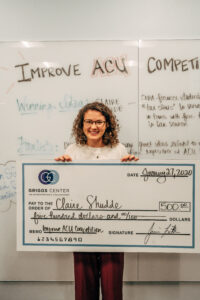
Claire Shudde
On January 27th, senior chemistry major Claire Shudde entered the Improve ACU Competition and left with a cash prize of $500 and the opportunity to make her idea come to life. The competition was co-hosted by the ACU Student Government Association (SGA) and the Griggs Center for Entrepreneurship and Philanthropy.
Mindy Howard, the Student Engagement Coordinator for the Griggs Center for Entrepreneurship and Philanthropy explained why they chose to create this competition. “We wanted to try and reach a larger sector of the student body and engage them in entrepreneurial thinking. The prompt was simply what are your ideas to improve ACU? We had 139 total entries and the finalists and winner were picked by the SGA student team. There were several really creative ideas submitted. Some of the top ideas included a community garden, a low-cost food pantry for students, and a student led spirit team at the ACU basketball games. Our hope was that students would take a moment to look around and see how their ideas could lead to real change at ACU. Every successful business, initiative or service starts with a great idea.”
Claire told us, “My idea to improve ACU is to have selected accounting and business students help lower income citizens in Abilene file their taxes. Filing taxes isn’t always easy and for people who either don’t have the education or ability to file for themselves, it can be a daunting task. If students at ACU — ideally selected by faculty who have witnessed the student’s desire and ability to serve the community in this way — can help locals file their taxes, they can gain real world experience while also benefiting the community.”
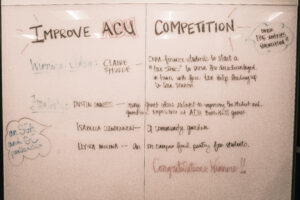
Shudde gave credit where credit is due for the idea. “I got the idea from a friend who attends St. Mary’s University in San Antonio. Their school is situated in an impoverished part of town and the students intentionally work on reaching out and ministering to the community. As a Christian school, I think ACU could follow suit and reach out to the community in this way. There is potential for this to be an incredible ministry in Abilene, and while accounting/finance majors help people with money, other students can minister to the people waiting.”
Claire continued, “I think the best way to establish this would be to partner with ministries like Love and Care or the Mission that are currently working and established. As a senior chemistry major, I am fairly far removed from accounting and finance, so I doubt I could be involved in the actual functioning of the tax clinic. Rather than be hands on myself, I would love to brainstorm with those who are knowledgeable in this area and will be in Abilene longer than me.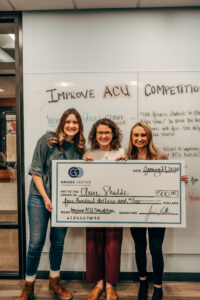 I think breaking the ACU bubble in this way will benefit both the community and the ACU students involved. My hope and prayer is that through simple actions such as helping a single mom file for a tax return, people can experience the love of God. Isaiah 1:17 says ‘Learn to do good, seek justice, correct oppression, bring justice to the fatherless, take up the case of the widow.’ While setting up a tax clinic does not fix all the problems in Abilene, I think it would be a chance for christians to live out this charge. I hope that in a few years I can look back and see ACU taking steps into the community beyond just a tax clinic.”
I think breaking the ACU bubble in this way will benefit both the community and the ACU students involved. My hope and prayer is that through simple actions such as helping a single mom file for a tax return, people can experience the love of God. Isaiah 1:17 says ‘Learn to do good, seek justice, correct oppression, bring justice to the fatherless, take up the case of the widow.’ While setting up a tax clinic does not fix all the problems in Abilene, I think it would be a chance for christians to live out this charge. I hope that in a few years I can look back and see ACU taking steps into the community beyond just a tax clinic.”
The ACU community often talks about the “ACU Difference”. Bright minded students who have a passion not only for ACU, but for making ACU and Abilene a greater place, are living, breathing examples of that difference. Congratulations to Claire Shudde on winning the competition! Want to learn more about the Griggs Center for Entrepreneurship and Philanthropy and how you can get involved? Click here to learn more.
by Katherine Norris | Dec 18, 2019 | Academics, Current Students, Faith Infusion, Social Entrepreneurship, Student Spotlights
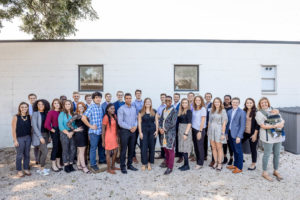 The American Enterprise Institute (AEI) is a public policy think tank and research program that works to advance ideas rooted in democracy and free enterprise. Recently, three ACU College of Business students were accepted into the initiative on Faith and Public Policy Honors Weekend Program. Bryce Adams, junior financial management major, TX, Jemimah Wavamunno, junior management major, and the author of this blog (myself), Katie Norris, junior marketing major.
The American Enterprise Institute (AEI) is a public policy think tank and research program that works to advance ideas rooted in democracy and free enterprise. Recently, three ACU College of Business students were accepted into the initiative on Faith and Public Policy Honors Weekend Program. Bryce Adams, junior financial management major, TX, Jemimah Wavamunno, junior management major, and the author of this blog (myself), Katie Norris, junior marketing major.
Going into the weekend, I can speak for all of us when I say that we had no idea what to expect. Bryce says that if he did have expectations, “They would have been exceeded. This program was inspiring, insightful, and has given me renewed motivation for a broader, Christ-centered vision.”
The main speakers were Brian Brenberg and Haley Robison, previously the CEO of Kammock. Each taught us how to recognize the underlying values and tensions that shape our decisions through a series of tutorials and practicums. We learned how to rethink our assumptions and take the bold first steps toward making our faith infused business ideas a reality.
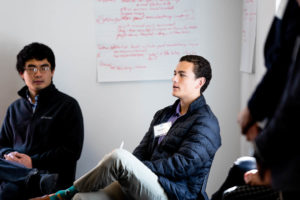
Bryce Adams
I asked Bryce and Jemimah which of the activities stood out to them and what they pulled from it. Bryce responded, “I loved the workshop we did with Brian Brenberg that related to assumptions and biases. In that workshop, he illustrated how we bring a set of assumptions baked into our worldview. Deconstructing those assumptions and creating practical steps to identify those was extremely helpful and impactful for me.” Jemimah said that thing that most resonated with her was, “The first segment of Design Thinking with Haley Robison, where we developed themes, metaphors, and conflicts in our inner passions with a supportive group of people.”
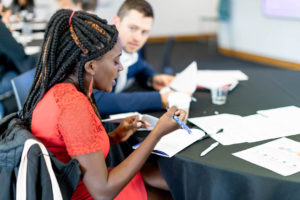
Jemimah Wavamunno
Each of us took something inspirational away from the program and came home with an overall sense of bewilderment and motivation.
Bryce said, “I loved seeing the other impressive students in the program. Their visions of the future give me hope that the world truly can be changed and it starts with people like us. Sitting across the table from people my age with the same ambitions was empowering for me.”
Jemimah reflected, “1) Nothing I do is neutral, everything I do has a narrative. 2) God sometimes allows you to endure wounds for you to be aware of and attuned to. In this, your purpose for a specific season is born because our wounds are individual to us, and therefore keep us attuned to others who carry the same wounds.”

I left the conference with the realization that I had the resources I needed to expand my business all along, I simply needed to find the motivation. This program gave me the confidence I had been lacking to take the next steps in bringing my business, ChronicallyBrave, to its full potential.
Jemimah is on the council of AEI executives and has attended many of their conferences. “This program was set up more intimately than most other AEI conferences are (in numbers, and living arrangements), which allowed for more genuine personal relationships, making following up with the relationships we made easier. It did not feel like people were getting to know you to get one more connection, but genuinely getting to know you, to learn the best way to serve and support you.”
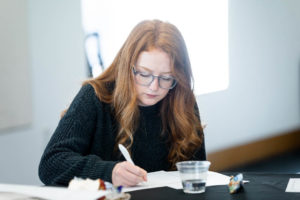
Katie Norris
We cannot recommend the program enough. The AEI team put together a truly motivating weekend experience and gathered some of the most inspiring faith based aspiring entrepreneurs that I have ever been in the same room with, nevertheless form life-long friendships with.
by Hanna Roberts | Apr 5, 2019 | Academics, COBA Faculty, Current Students, Social Entrepreneurship
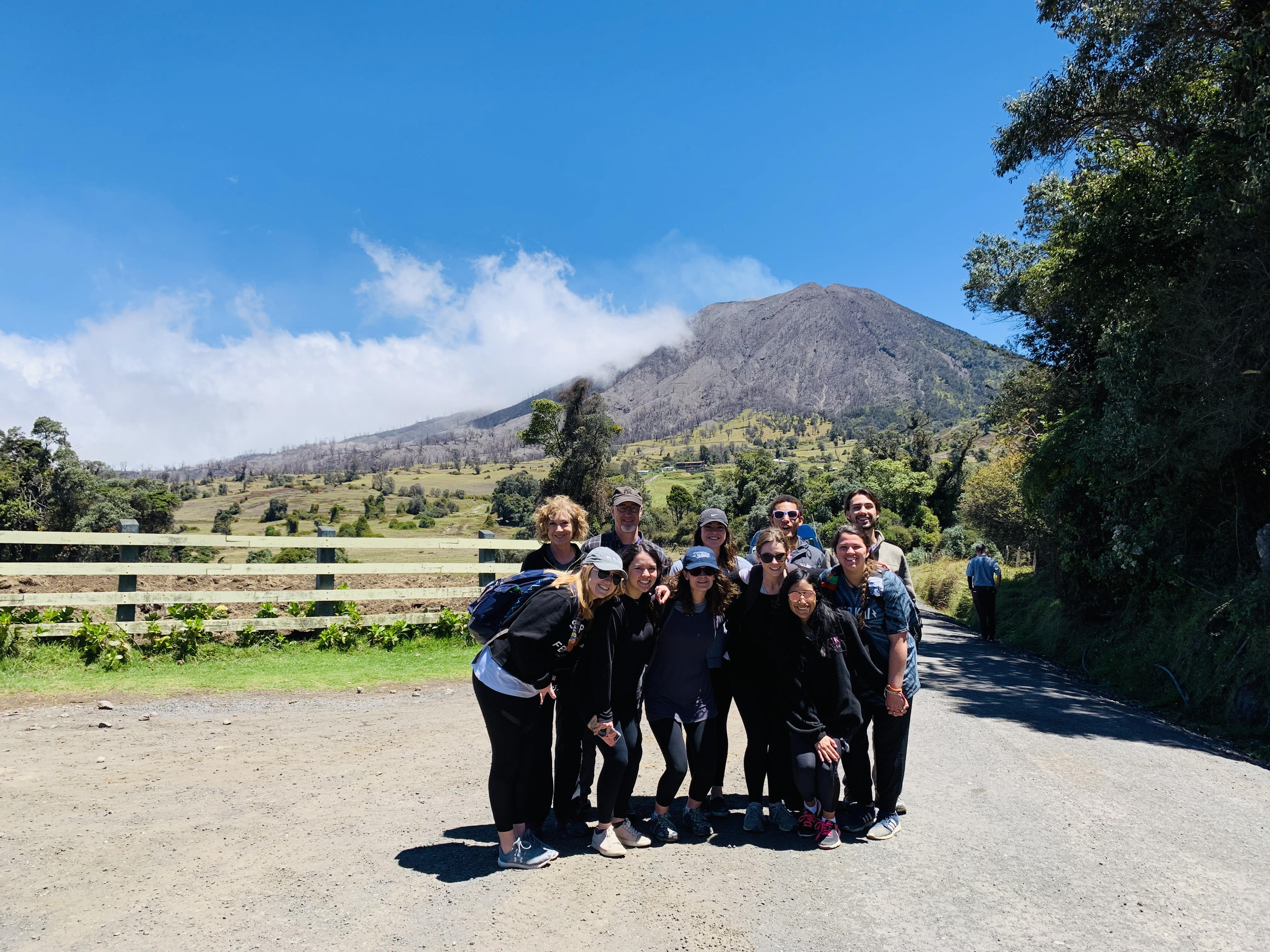 Over spring break, a group of students led by Dr. Laura Phillips and Dr. Sarah Easter traveled to Costa Rica for the first ever Social Enterprise Consulting (MGMT 440) class. This project-based course is designed to give students hands-on experience dealing with a real and substantial issue faced by a socially-minded organization. Students spent six weeks prior to spring break learning about the basics of consulting and learning about the cultural context of the country and organizations they would visit. They were challenged to complete research on the industry and market and received training from the Rotary International campus in Denton, who were also training the entrepreneurs in Costa Rica. “We wanted the students to be prepared in diverse capacities,” said Dr. Easter “That way, when we traveled to Costa Rica, they were as effective as possible in the one-week in-country visit.”
Over spring break, a group of students led by Dr. Laura Phillips and Dr. Sarah Easter traveled to Costa Rica for the first ever Social Enterprise Consulting (MGMT 440) class. This project-based course is designed to give students hands-on experience dealing with a real and substantial issue faced by a socially-minded organization. Students spent six weeks prior to spring break learning about the basics of consulting and learning about the cultural context of the country and organizations they would visit. They were challenged to complete research on the industry and market and received training from the Rotary International campus in Denton, who were also training the entrepreneurs in Costa Rica. “We wanted the students to be prepared in diverse capacities,” said Dr. Easter “That way, when we traveled to Costa Rica, they were as effective as possible in the one-week in-country visit.”
In Costa Rica, the class worked with the Centro Agronómico Tropical de Investigación y Enseñanza (CATIE), which is a regional center in Costa Rica dedicated to research and graduate education in agriculture, and the management, conservation and sustainable use of natural resources. In collaboration with CATIE, Red de Emprendedoras del Turismo Sostenible de Turrialba (RETUS) is a network of female entrepreneurs focused on experiential rural tourism offerings as a means to help provide sustainable livelihoods to the three involved communities in Central Costa Rica – Santa Cruz, Guavabo and Mollejones. CATIE and RETUS are interested in better understanding the US market for sustainable rural tourism in Costa Rica as well as the development of a promotional marketing plan to successfully reach identified markets in order to grow and develop RETUS further. The class stayed in a small town called Turrialba on the CATIE campus. Over the course of three days, they visited the three communities and observed experiential tourism offerings in each location.
The consulting nature of the course was focused on students engaging with the women entrepreneurs in terms of ecotourism, which means that tourists engage in local culture when on vacation rather than staying within the confines of a resort or hotel for the duration of their stay. Students evaluated the offerings of each entrepreneur from a US – and specifically Texas – tourist perspective. They spent time in each community taking detailed field notes and giving preliminary recommendations and then spent a full day with the class debriefing and identifying weaknesses and opportunities of the offerings in consideration of US customers.
 With the focus on ecotourism consulting, the students got to experience Costa Rica in special ways that emphasized interactions with the local culture. “The most eye-opening thing about this trip was the cultural immersion. To actively participate in activities with the locals gave me a unique perspective into who they are,” said Luke Stevens, a junior marketing major from Montgomery, TX. “Instead of feeling like an outsider looking in, I felt more like I was a part of them. Overall, I think I got more out of this trip because it had a focus and purpose as opposed to a regular spring break trip. I would rather have that type of experience than a relaxing week on the beach.” Among other things, the class toured the remains of a Pre-Colombian ruin, visited a butterfly farm, and even learned how to salsa dance. On their final day, they got to go zip lining through the jungle and rappel down waterfalls. “Since I come from a Central American country, I was really impressed by the ‘Tico culture,’ which is what Costa Ricans often call themselves, and how important it is to them that they grow as a community instead of as individuals,” noted Mafer Hernandez, a junior finance major from Guatemala City, Guatemala. They were also really invested in reducing contamination, their roads were clean and they also had several recycle bins.”
With the focus on ecotourism consulting, the students got to experience Costa Rica in special ways that emphasized interactions with the local culture. “The most eye-opening thing about this trip was the cultural immersion. To actively participate in activities with the locals gave me a unique perspective into who they are,” said Luke Stevens, a junior marketing major from Montgomery, TX. “Instead of feeling like an outsider looking in, I felt more like I was a part of them. Overall, I think I got more out of this trip because it had a focus and purpose as opposed to a regular spring break trip. I would rather have that type of experience than a relaxing week on the beach.” Among other things, the class toured the remains of a Pre-Colombian ruin, visited a butterfly farm, and even learned how to salsa dance. On their final day, they got to go zip lining through the jungle and rappel down waterfalls. “Since I come from a Central American country, I was really impressed by the ‘Tico culture,’ which is what Costa Ricans often call themselves, and how important it is to them that they grow as a community instead of as individuals,” noted Mafer Hernandez, a junior finance major from Guatemala City, Guatemala. They were also really invested in reducing contamination, their roads were clean and they also had several recycle bins.”
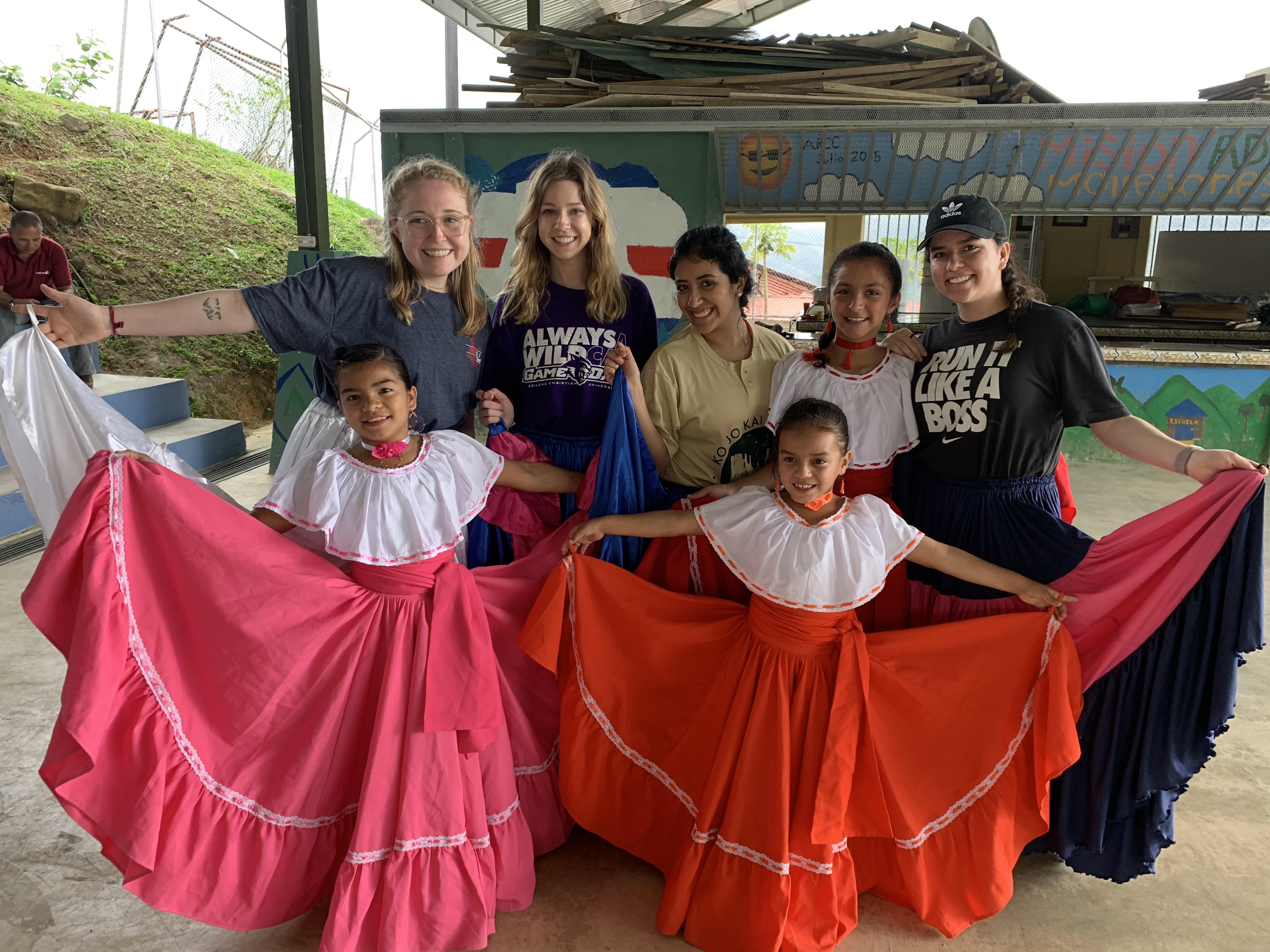 Now that they have returned from Costa Rica, students are working on a full report and marketing assessment that gives promotional and placement considerations for the women entrepreneurs. The project-based experience has been invaluable for students as they have gotten a chance to apply what they have been learning in class to real life – and in a meaningful, purpose-driven way. Dr. Easter’s favorite part of the trip was twofold; “I loved watching how passionate the women entrepreneurs are about their businesses and communities and how driven they were in their desire to share that passion with outsiders,” she said. “I also enjoyed watching the students in that international setting. It was neat seeing them interact with people in the community and dive into the experience fully. Traveling with students and watching how much they learn and grow in a short time frame is always incredible”
Now that they have returned from Costa Rica, students are working on a full report and marketing assessment that gives promotional and placement considerations for the women entrepreneurs. The project-based experience has been invaluable for students as they have gotten a chance to apply what they have been learning in class to real life – and in a meaningful, purpose-driven way. Dr. Easter’s favorite part of the trip was twofold; “I loved watching how passionate the women entrepreneurs are about their businesses and communities and how driven they were in their desire to share that passion with outsiders,” she said. “I also enjoyed watching the students in that international setting. It was neat seeing them interact with people in the community and dive into the experience fully. Traveling with students and watching how much they learn and grow in a short time frame is always incredible”
A grant from Southwest Airlines for plane tickets and scholarships from COBA, as well as the partnerships with Rotary International, CATIE, and RETUS made this trip possible and effective for the students and faculty that attended. We are extremely proud of our students for choosing to spend their spring break applying their business skills to serve others in a global context. We look forward to watching how this class grows in the future and other opportunities our students will have to affect change.
by Hanna Roberts | Jan 25, 2019 | Academics, City of Abilene, Current Students, Social Entrepreneurship, Uncategorized
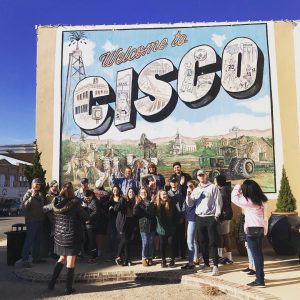
Business & Sustainability students take a tour of the newly revitalized Cisco Downtown.
In January, twenty-two students attended Dr. Sarah Easter’s Business & Sustainability course (MGMT 440), a one-week intensive class that educates students on the opportunities and challenges of developing more sustainable business strategies and practices, and to explore the changing role of business in society and in relation to the environment. “Typically in business, we focus on financial sustainability,” Dr. Easter explained. “We fail to consider the economic and social well-being aspects of sustainability, so this course looks at the impact businesses can have on the community and environment as well.” The course offers many different perspectives on sustainability, examining what that means for a variety of different companies, from large, global corporations to local, small businesses.
This was the third year that the course has been offered but the first year that Dr. Easter incorporated out-of-town field trips in addition to several guest speakers. The students spoke with Abilene business owners, several ACU professors from varying colleges, and with a panel of Cisco downtown business owners. Students took a tour around ACU with Corey Ruff, Associate Vice President of Operations, to understand the campus initiatives for sustainability on a deeper level. They also went to Disability Resources Inc., a residential community for individuals with intellectual disabilities.
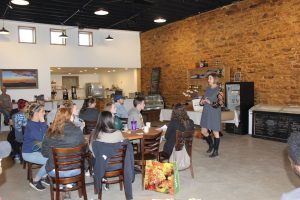
Cisco mayor Tammy Douglas speaks to Business & Sustainability students.
The students spent half a day in Cisco, TX. They spoke with Joy and Kerry Hedges, the owners of Slowpoke Farms and Slowpoke Market Store. The Hedges made significant lifestyle changes for sustainability regarding the food and products they consumed and extended those values beyond their personal life to their farming methods and business practices. In September, they opened the Slowpoke Market Store, which students were able to visit. The Slowpoke Market Store is a part of the revitalization effort in the downtown Cisco area. Students interacted with a panel of other business owners in the downtown area that are also involved with the revitalization efforts and with Tammy Douglas, Cisco’s first female mayor. Douglas explained the importance of local resources and how they have incorporated sustainable practices in the changes occurring in Cisco and gave students a tour of the downtown area.
By the end of the class, students were able to recognize interactions between environmental, social, and economic decisions, understand the power of business to negatively or positively impact their surroundings, gained exposure to how a variety of different organizations and perspectives tackle today’s sustainability challenges, and became more aware of their own role when participating in personal and professional decisions related to sustainability. Marissa Hickson, a senior marketing major, said that “the most impactful thing I learned in the class was the importance of researching the background, goals, and values of the companies I support. We learned how to evaluate sustainability reports and determine whether or not a company’s values align with ours. I learned that a lot of companies that I have trusted in the past don’t actually operate in the most ethical ways! It’s great to be aware of this now so that I can be sure to support the companies who are actively working to make our world a better place.” The class will be offered next January, so students can ask your advisor about this offering.
by M. C. Jennings | Sep 14, 2018 | Academics, COBA Faculty, Current Students, Faith Infusion, Social Entrepreneurship, Student Spotlights, Uncategorized
COBA professors and students were world travelers this summer, as we have covered in parts 1 and 2 of our blog series on our study abroad trips. This July, professors Laura and Mark Phillips took students to Central America where they received course credit in MGMT 419 (Global Entrepreneurship) and MGMT 340 (Fundamentals of Life Design). We asked Dr. Laura Phillips to tell us about their experience. We hope you enjoy the third installment of our four part blog series on the 2018 travels of the COBA Study Abroad program.
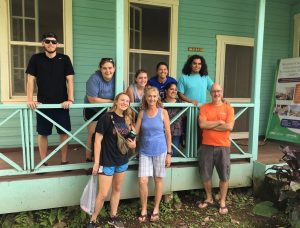
What made Central America a unique place to study?
Central America is a unique place to study Global Entrepreneurship because while the culture, laws, and economic environment are different from the United States, Central America is a place with lots of start-up businesses. Also, the people are very hospitable which makes visiting start-ups easier. In addition, Central America is small geographically but the different countries are unique. Some of the challenges of starting a business in Costa Rica are different from the challenges of starting a business in Honduras. Finally, we were able to see first hand how the government can drastically alter the business environment; the recent unrest in Nicaragua is an unfortunate example of the instability inherent in emerging economies.
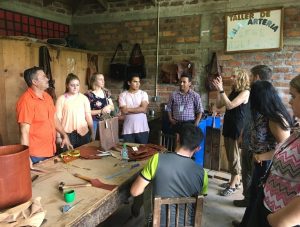
What businesses were you able to visit?
I’m not even sure where to start here. I guess I’ll just make a list.
San Jose, Costa Rica
- Yuxta Energy–solar energy
- e.e.d.–legal services for social ventures
- VivaIdea–a think tank for increasing the impact of entrepreneurship in Latin America
Guanacaste region
- Vida Adventura–adventure camp
- Hotel Las Tortugas–small private hotel in Playa Grande
- Taco Star–taco shop on the beach
Sarapiqui region
- Chilamate Rainforest Eco Retreat
Turrialba region
- CATIE University and the Sustainability House
- butterfly farm
- dairy/cheese making business
- beneficial plants business (medicinal, herbs, etc.)
- pueblo tourism business
Honduras
- Mission Lazarus–here we also
- made organic fertilizer
- conducted a half day training session for the students and teachers at the vocational schools on basic business topics
- hardware store
- bootmaker
- trash collector/recycler
- restaurant owner
- coffee farm/barber shop/tienda owner
For the most part we visited with the entrepreneur (or an employee for the larger organizations) to learn about what they do, what the biggest challenges are, how/if they plan to grow, etc.
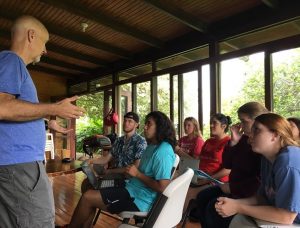
Did you take the students on any sight seeing tours?
- Walking tour of San Jose
- Ziplining at Vida Adventura
- Horseback riding at Vida Adventura
- Surfing lessons at Playa Grande or
- Canoeing on the estuary at Playa Grande
- Birdfinding nature walk
- Hike to waterfall and swimming
- Cultural scavenger hunt (milking cows, Latin dancing, making tortillas, etc.
- Archaeological tour
The students enjoyed the sightseeing activities. They were a lot of fun.
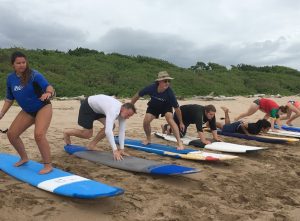
What is it like to be able to spend so much time with students in another country? How does it differ than being in a classroom setting in Abilene?
This particular study abroad is different from going to Oxford or Leipzig because we really are all together most of the time. There were even a couple of places where we stayed in one big house. It’s very different because in Abilene you are with your students in class and then they do their own thing the rest of the time. On this study abroad we usually eat together, we travel together, we spend much of our free time together, plus we have class together. You really get to know each other and, as the students said, you become more like family.
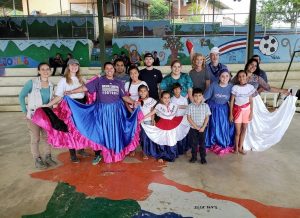
What were your favorite moments/experiences of the trip?
Well, I love the fact that we are outside so much and that even when you are “inside” you are usually outside. In many ways life is harder but in many ways it’s simpler. The pace of life is slower and the people put more emphasis on relationships than on to-do lists. Most of our students found the Latin pace therapeutic. There were many great experiences but one of my favorites was going in the butterfly house. The house was full of flowers and the butterflies seemed like flying flowers. It was beautiful.
I also loved watching our students conduct the business training for the people at Mission Lazarus. That activity was a real challenge and stretch for our students, especially since we were having to work through a translator. They students rose to the challenge and did a fantastic job!
If students could only learn one thing, what do you hope they learned?
I would want our students to learn that people are people everywhere; we are more similar than we are different. I would want them to learn that there are business opportunities everywhere but that to be successful you MUST know the culture and context of the place in which you are operating. I would want them to know that the fast-paced, individualistic, climb to the top American business style is not the only way to live. I would want them to know that being happy and being successful are not directly tied to a salary amount or prestige. (So…that’s four things, but they are kind of related.)
by M. C. Jennings | Jun 28, 2018 | Academics, Current Students, Faith Infusion, Social Entrepreneurship, Uncategorized
Students often take advantage of summer courses to receive credit in a compressed amount of time and effectively use block tuition. Those summer courses can sometimes be a little more creative in the way they are taught – even in deciding the location for the class. MGMT 320: Social Entrepreneurship is no exception to that rule. Social Entrepreneurship is taught at City Square in downtown Dallas by Dr. Laura Phillips over the course of five days. Business students are not the only students who take the class. Phillips says, “The social entrepreneurship course is appropriate for business majors and non-business majors alike. We’ve had students in the class who are studying art, English, architecture and political science – just to name a few. It’s also relevant for students at different points in their academic career. I’ve had students who just finished their first year of college in the class as well as students who are taking it as their very last class. It may seem overwhelming to squeeze an entire class into a week, but it’s an engaging and inspiring week!” We asked a couple of the students who completed the course to tell us a little about why they chose to take the class and what they took away from the week.

Ashleigh Price (’18) management major from Sunnyvale, Texas said, “I had one more class I needed to take to complete my degree and was really looking for classes in that last semester that focused on the field I wanted to go in to – poverty and development. It was convenient since I lived in Dallas and I had heard so many great things about it, so I jumped on it!” Jordan Eason, senior accounting major from Keller, Texas said, “I had always wanted to take this class, because I had heard from others that it was a great class. I am also very interested in social entrepreneurship from my time volunteering with various non-profit organizations.”
Tell us a little bit about the format of the class. What was a typical day like?
Jordan: “In the class, we had a lot of guest speakers come to us but we also went on field trips to businesses, too. A typical day included hearing from guests and then engaging in a lot of discussion to process what we were learning.”
Ashleigh: “There is no such thing as a typical day! Every day is special in its own way. The first and last days included a few speakers but we were also taking care of administrative tasks and assignments including group work. On Tuesday through Thursday, however, we had a networking lunch (Tuesday) and breakfasts (Wednesday and Thursday). We were able to sit down with the guest speakers and talk about our passions. We were also able to hear the coolest testimonies of business owners and people who are in prominent positions in large companies like Southwest Airlines and HKS. Every day, we had additional speakers along with the networking. In those sessions, we heard about real life situations and learned applicable skills to apply to our potential business models.”

Cafe Momentum
Tell us about some of the speakers and/or experiences that stood out to you?
Jordan: “We visited a restaurant in Dallas called Café Momentum and heard from the entrepreneur that started it, Chad Houser. At his café, he employs and trains teens that have been in juvenile detention. His hope is for them to be placed in a job and leave the café once they finish the program. We actually were able to eat at the restaurant, which was named one of the top restaurants in Dallas. It was great to hear him talk about his mission and the passion he had for what he was doing.”
Ashleigh: “One of my favorite speakers was Todd Spinks who works for Southwest and possessed a love for people, wanting to unite them to work for good. Another was Chad Houser who runs Cafe Momentum which helps to rehabs kids, get them jobs, and gets them off the streets. There were others that I loved (and honestly all of them were really great) but these two people had a lot of impact on me.”
What was your favorite thing about the class?
Jordan: “My favorite thing about the class was getting to have conversations with the guest speakers. On two of the days of class, we were able to have breakfast with them. There was one guest to a table of 3-4 students, so we were able to have great conversations and ask them questions. The guests were all so kind to take that time out of their day to talk with us.”
Ashleigh: “The connections made and the subjects talked about – any and all things having to do with social enterprise.”
What surprised you the most about the class or any of your experiences in the class?
Jordan: “I learned a lot in this class, specifically of ways to help people without hurting them. It was surprising that different ways of poverty alleviation were useful in certain areas but not in others. We really learned how there is not a one size fits all solution and that was echoed by speakers through the week.”
Ashleigh: “I was expecting it to be a lot of work but it wasn’t like that at all. It was constructive and thought provoking. It reminded me a lot of Leadership Summit. It was basically a mini LS but it focused on doing good rather than leadership.”
Ashleigh went on to say that the class has, “Changed how I view poverty and what people in those situations need versus what I think they need. They know what they need better than I ever could. It showed me how much more diverse I need to make my friend circle. The class also confirms my love of this career path and it has given me tools to use in the future at either my own business or in a position with a company or organization.”
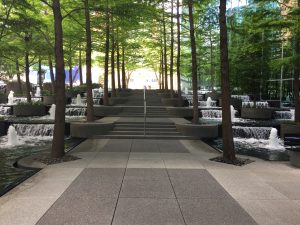
Social Entrepreneurship at CitySquare is pushing students to think outside the box and time again, they state how much they love the class. How about the professor? We asked Dr. Phillips a few questions about the course as well.
What is your favorite thing about teaching the class?
Dr. Phillips: “Almost every day one of the students makes a comment to me about how a particular speaker or a field trip has ‘blown their mind’. I think that’s my favorite thing about teaching the class. Some students are blown away by the inequalities that exist around them that they’ve never noticed before. For some students what blows their mind is the variety of creative ways people are using their business to achieve social impact in their community. For other students the most eye-opening aspect of class is the wide variety of backgrounds our speakers come from – the fact that there’s not a prescribed path to social entrepreneurship. I love being able to sit back and watch their eyes open up to a whole new world of possibilities.”
I know you have many speakers that come in to talk to the students. Who are some that have made a big impact on the students?
Dr. Phillips: “This question is hard to answer because the students have different favorite speakers. That’s one of the nice things about bringing in a wide variety. While they may appreciate and learn from all of the speakers, students typically really connect with a handful of our guests and who that is varies from student to student. A couple of speakers who are perennial favorites are John Siburt, President and COO of CitySquare, and Chad Houser, CEO and Executive Chef at Cafe Momentum. Both are charismatic, innovative, and inspiring and they motivate the students to have big dreams.”
What do you hope students will take away from the class?
Dr. Phillips: “I hope that students will leave class with the understanding that they can choose to do good through their business regardless of what that business is. I also hope they leave class with a set of tools and contacts that make them feel empowered and capable of launching a social enterprise – maybe soon, maybe not for 20 years.”
The College of Business seeks to inspire, equip, and connect students to honor God and bless others. We can’t wait to see what these students do to change the world. Any student wanting to learn more about the next offering for MGMT 320: Social Entrepreneurship can contact their academic advisor or Dr. Laura Phillips.


 I think breaking the ACU bubble in this way will benefit both the community and the ACU students involved. My hope and prayer is that through simple actions such as helping a single mom file for a tax return, people can experience the love of God. Isaiah 1:17 says ‘Learn to do good, seek justice, correct oppression, bring justice to the fatherless, take up the case of the widow.’ While setting up a tax clinic does not fix all the problems in Abilene, I think it would be a chance for christians to live out this charge. I hope that in a few years I can look back and see ACU taking steps into the community beyond just a tax clinic.”
I think breaking the ACU bubble in this way will benefit both the community and the ACU students involved. My hope and prayer is that through simple actions such as helping a single mom file for a tax return, people can experience the love of God. Isaiah 1:17 says ‘Learn to do good, seek justice, correct oppression, bring justice to the fatherless, take up the case of the widow.’ While setting up a tax clinic does not fix all the problems in Abilene, I think it would be a chance for christians to live out this charge. I hope that in a few years I can look back and see ACU taking steps into the community beyond just a tax clinic.”  The American Enterprise Institute (AEI) is a public policy think tank and research program that works to advance ideas rooted in democracy and free enterprise. Recently, three ACU College of Business students were accepted into the initiative on Faith and Public Policy Honors Weekend Program. Bryce Adams, junior financial management major, TX, Jemimah Wavamunno, junior management major, and the author of this blog (myself), Katie Norris, junior marketing major.
The American Enterprise Institute (AEI) is a public policy think tank and research program that works to advance ideas rooted in democracy and free enterprise. Recently, three ACU College of Business students were accepted into the initiative on Faith and Public Policy Honors Weekend Program. Bryce Adams, junior financial management major, TX, Jemimah Wavamunno, junior management major, and the author of this blog (myself), Katie Norris, junior marketing major. 



 Over spring break, a group of students led by Dr. Laura Phillips and Dr. Sarah Easter traveled to Costa Rica for the first ever Social Enterprise Consulting (MGMT 440) class. This project-based course is designed to give students hands-on experience dealing with a real and substantial issue faced by a socially-minded organization. Students spent six weeks prior to spring break learning about the basics of consulting and learning about the cultural context of the country and organizations they would visit. They were challenged to complete research on the industry and market and received training from the Rotary International campus in Denton, who were also training the entrepreneurs in Costa Rica. “We wanted the students to be prepared in diverse capacities,” said Dr. Easter “That way, when we traveled to Costa Rica, they were as effective as possible in the one-week in-country visit.”
Over spring break, a group of students led by Dr. Laura Phillips and Dr. Sarah Easter traveled to Costa Rica for the first ever Social Enterprise Consulting (MGMT 440) class. This project-based course is designed to give students hands-on experience dealing with a real and substantial issue faced by a socially-minded organization. Students spent six weeks prior to spring break learning about the basics of consulting and learning about the cultural context of the country and organizations they would visit. They were challenged to complete research on the industry and market and received training from the Rotary International campus in Denton, who were also training the entrepreneurs in Costa Rica. “We wanted the students to be prepared in diverse capacities,” said Dr. Easter “That way, when we traveled to Costa Rica, they were as effective as possible in the one-week in-country visit.” With the focus on ecotourism consulting, the students got to experience Costa Rica in special ways that emphasized interactions with the local culture. “The most eye-opening thing about this trip was the cultural immersion. To actively participate in activities with the locals gave me a unique perspective into who they are,” said Luke Stevens, a junior marketing major from Montgomery, TX. “Instead of feeling like an outsider looking in, I felt more like I was a part of them. Overall, I think I got more out of this trip because it had a focus and purpose as opposed to a regular spring break trip. I would rather have that type of experience than a relaxing week on the beach.” Among other things, the class toured the remains of a Pre-Colombian ruin, visited a butterfly farm, and even learned how to salsa dance. On their final day, they got to go zip lining through the jungle and rappel down waterfalls. “Since I come from a Central American country, I was really impressed by the ‘Tico culture,’ which is what Costa Ricans often call themselves, and how important it is to them that they grow as a community instead of as individuals,” noted Mafer Hernandez, a junior finance major from Guatemala City, Guatemala. They were also really invested in reducing contamination, their roads were clean and they also had several recycle bins.”
With the focus on ecotourism consulting, the students got to experience Costa Rica in special ways that emphasized interactions with the local culture. “The most eye-opening thing about this trip was the cultural immersion. To actively participate in activities with the locals gave me a unique perspective into who they are,” said Luke Stevens, a junior marketing major from Montgomery, TX. “Instead of feeling like an outsider looking in, I felt more like I was a part of them. Overall, I think I got more out of this trip because it had a focus and purpose as opposed to a regular spring break trip. I would rather have that type of experience than a relaxing week on the beach.” Among other things, the class toured the remains of a Pre-Colombian ruin, visited a butterfly farm, and even learned how to salsa dance. On their final day, they got to go zip lining through the jungle and rappel down waterfalls. “Since I come from a Central American country, I was really impressed by the ‘Tico culture,’ which is what Costa Ricans often call themselves, and how important it is to them that they grow as a community instead of as individuals,” noted Mafer Hernandez, a junior finance major from Guatemala City, Guatemala. They were also really invested in reducing contamination, their roads were clean and they also had several recycle bins.” Now that they have returned from Costa Rica, students are working on a full report and marketing assessment that gives promotional and placement considerations for the women entrepreneurs. The project-based experience has been invaluable for students as they have gotten a chance to apply what they have been learning in class to real life – and in a meaningful, purpose-driven way. Dr. Easter’s favorite part of the trip was twofold; “I loved watching how passionate the women entrepreneurs are about their businesses and communities and how driven they were in their desire to share that passion with outsiders,” she said. “I also enjoyed watching the students in that international setting. It was neat seeing them interact with people in the community and dive into the experience fully. Traveling with students and watching how much they learn and grow in a short time frame is always incredible”
Now that they have returned from Costa Rica, students are working on a full report and marketing assessment that gives promotional and placement considerations for the women entrepreneurs. The project-based experience has been invaluable for students as they have gotten a chance to apply what they have been learning in class to real life – and in a meaningful, purpose-driven way. Dr. Easter’s favorite part of the trip was twofold; “I loved watching how passionate the women entrepreneurs are about their businesses and communities and how driven they were in their desire to share that passion with outsiders,” she said. “I also enjoyed watching the students in that international setting. It was neat seeing them interact with people in the community and dive into the experience fully. Traveling with students and watching how much they learn and grow in a short time frame is always incredible”








